제휴 마케팅이 수익을 높이고 브랜드 인지도를 높이며 광고주와 퍼블리셔 간의 관계를 강화하는 핵심 디지털 마케팅 전략이라는 것은 누구나 알고 있는 사실입니다. 하지만 적절한 가이드 없이 이 분야에 뛰어들면 성공을 방해하는 일반적인 함정에 빠질 수 있습니다. 2024년이 다가오면서 이러한 실수를 인식하는 것뿐만 아니라 이를 방지할 수 있는 지식과 도구로 무장하는 것이 중요합니다. 이 글에서는 일반적인 제휴 마케팅 문제를 나열하는 데 그치지 않고, 현재 트렌드에 따라 보다 효과적이고 수익성 있는 제휴 마케팅 전략을 개발하는 데 도움이 되는 실행 가능한 솔루션과 모범 사례를 제공합니다.
1. 잘못된 제휴 상품 선택
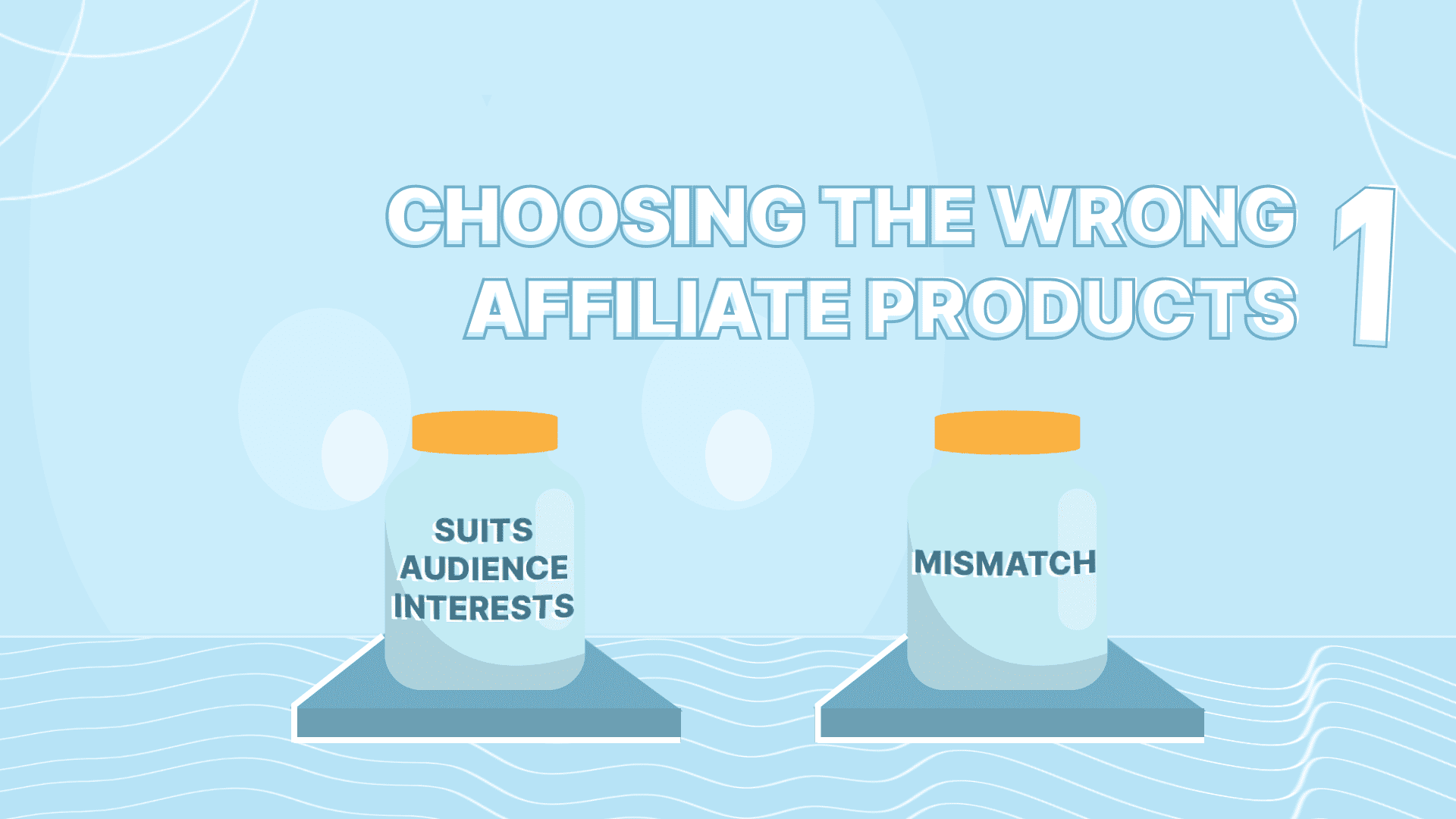
제휴 마케팅에서 흔히 저지르는 실수 중 하나는 부적절한 제휴 제품을 선택하는 것입니다. 이 문제는 선택한 제품과 타겟 오디언스의 관심사 또는 니즈 사이에 단절이 있을 때 발생합니다. 이러한 불일치의 결과는 품질이 낮거나 대상 고객과 무관한 제품을 홍보하는 것입니다. 이는 오디언스를 소외시킬 뿐만 아니라 마케터의 신뢰도를 떨어뜨려 잠재적으로 참여도와 신뢰도 하락으로 이어질 위험이 있습니다.
작업 솔루션
이러한 함정에서 벗어나기 위해 마케터는 다음을 수행해야 합니다. 잠재고객을 깊이 이해하기 위해 시간과 노력을 투자합니다. 여기에는 오디언스의 관심사, 선호도 및 도전 과제를 조사하여 홍보하는 제품과 오디언스의 기대치가 완벽하게 일치하도록 하는 것이 포함됩니다. 오디언스의 니즈에 부합하는 제품을 선택하고 제품 선택 시 높은 수준의 품질을 유지하면 제휴 마케팅 캠페인의 효과를 크게 높일 수 있습니다. 이러한 신중한 제품 선택 및 프로모션 전략은 신뢰를 구축하고 충성도를 높이며 전환을 유도하여 성공적이고 지속 가능한 제휴 마케팅 벤처의 토대를 마련합니다.
2. SEO의 중요성 무시
제휴 마케팅에 만연한 또 다른 실수는 검색 엔진 최적화(SEO)의 중요성을 과소평가하는 것입니다. 많은 제휴 마케팅 담당자가 자연 검색 트래픽의 힘을 간과하고 키워드 조사 및 콘텐츠 최적화의 중요한 단계를 소홀히 합니다. 이러한 간과로 인해 검색 엔진에서 콘텐츠의 가시성이 떨어질 뿐만 아니라 타겟 고객과의 잠재적 도달 범위와 참여도도 심각하게 제한됩니다. SEO 전략을 통합하지 못하면 마케터는 판매로 전환할 수 있는 고품질의 타겟 트래픽을 유치하는 데 필수적인 검색 결과에서 더 높은 순위를 차지할 기회를 놓치게 됩니다.
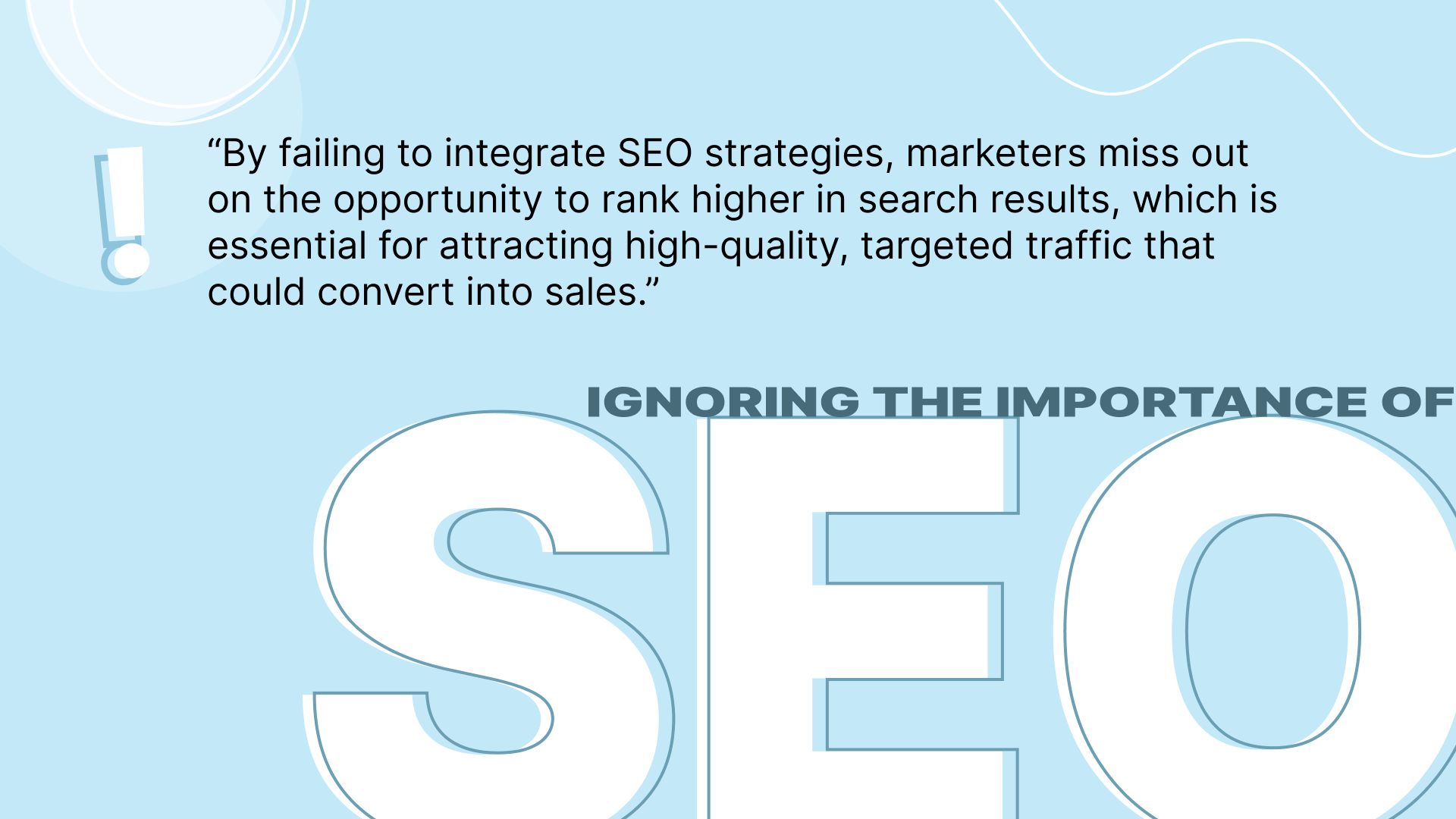
작업 솔루션
이러한 상황을 피하려면 전문가는 다음을 수행해야 합니다. 포괄적인 SEO 전략을 수용하세요. 이를 위해서는 잠재 고객이 검색하는 용어와 구문을 파악하기 위해 철저한 키워드 조사를 수행해야 합니다. 이러한 키워드를 고품질의 관련성 높은 콘텐츠에 자연스럽게 통합하면 가시성을 크게 높이고 유기적인 트래픽을 유도할 수 있습니다. 또한 웹사이트 구조를 최적화하고 빠른 로딩 시간을 보장하며 고품질 백링크를 확보하는 것도 검색 순위를 높이는 데 중요한 단계입니다. 지속적인 SEO 교육에 참여하고 최신 검색 엔진 알고리즘을 업데이트하면 이러한 노력을 더욱 구체화할 수 있습니다. 제휴 마케팅 담당자는 SEO를 우선시함으로써 온라인 인지도를 획기적으로 개선하여 더 많은 트래픽을 유도하고 궁극적으로 더 나은 전환율을 달성할 수 있습니다.
3. 고품질 콘텐츠의 필요성 간과
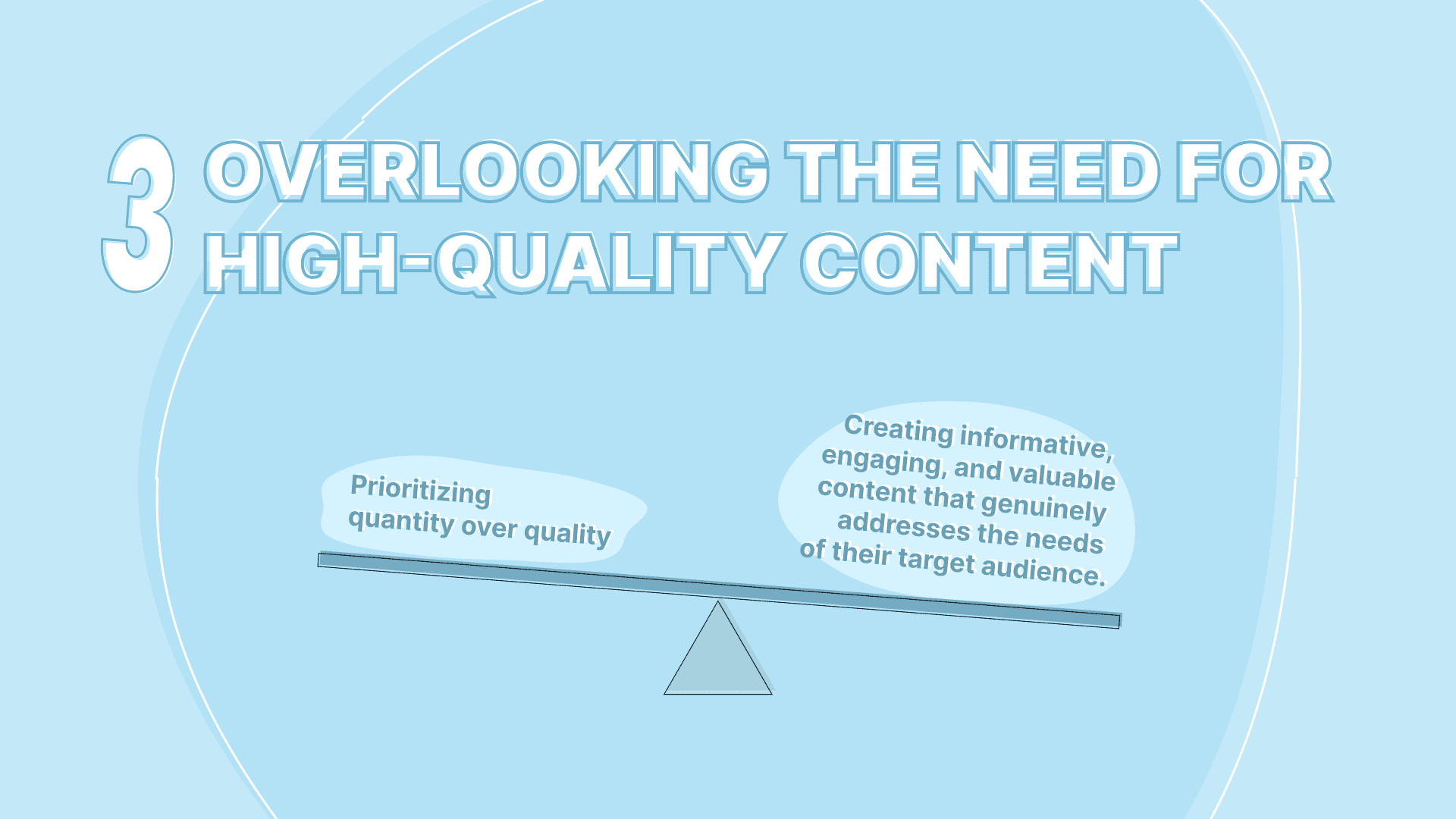
고품질 콘텐츠의 중요성을 인식하지 못하는 것은 제휴 마케팅에서 흔히 발생하는 문제입니다. 많은 제휴 마케팅 담당자가 질보다 양을 우선시하는 함정에 빠져 가치 있고 매력적인 콘텐츠가 마케팅 전략에서 차지하는 중요한 역할을 과소평가합니다. 고품질 콘텐츠는 단순히 제휴 링크를 삽입하기 위한 수단이 아니라 오디언스와의 신뢰와 권위를 구축하는 토대입니다. 깊이, 관련성 또는 참여도가 부족한 콘텐츠는 잠재 고객의 공감을 얻지 못하여 전환율이 떨어지고 틈새 시장에서 신뢰도가 떨어집니다. 이러한 접근 방식의 결과는 마케터의 평판과 장기적인 성공에 영향을 미치는 광범위한 결과를 초래합니다.
작업 솔루션
이러한 위험에서 벗어나려면 제휴 마케팅 담당자는 다음을 수행해야 합니다. 콘텐츠 우선 접근 방식을 채택하세요, 타겟 고객의 요구와 관심사에 진정으로 부합하는 유익하고 매력적이며 가치 있는 콘텐츠를 만드는 데 집중합니다. 여기에는 시청자의 선호도, 인기 있는 주제, 기존 콘텐츠 환경의 격차를 이해하기 위한 조사에 시간을 투자하는 것이 포함됩니다. 양질의 콘텐츠는 다른 곳에서 쉽게 얻을 수 없는 인사이트, 솔루션 또는 엔터테인먼트를 제공해야 충성도 높은 오디언스 기반을 유치하고 유지할 가능성이 높아집니다. 또한 SEO 모범 사례, 멀티미디어 요소, 강력한 콜투액션을 통합하면 콘텐츠의 효과를 더욱 높일 수 있습니다. 제휴 마케팅 담당자는 양보다 질을 우선시함으로써 오디언스와 신뢰 기반의 강력한 관계를 구축하여 참여도를 높이고 전환율을 높이며 제휴 마케팅 활동에서 지속 가능한 성공을 거둘 수 있습니다.
4. 청중과의 신뢰 구축 실패

제휴사들은 오디언스 간의 신뢰를 구축하는 것이 얼마나 중요한지 간과하는 경우가 많습니다. 이러한 신뢰 결핍은 마케터가 오디언스와의 장기적인 관계보다 단기적인 이익을 우선시할 때 발생하며, 일반적으로 프로모션에서 투명성과 정직성의 중요성을 간과합니다. 오늘날 오디언스는 브랜드에서 진정성과 진실성을 추구하기 때문에 신뢰의 기반이 없으면 아무리 매력적인 마케팅 전략도 흔들릴 수 있습니다. 제휴 관계에 대해 솔직하지 않거나 진정한 확신 없이 제품을 추천하는 것은 신뢰도를 떨어뜨리고 잠재적으로 충성도가 높은 잠재 고객층을 멀어지게 할 수 있습니다.
작업 솔루션
다음을 수행하는 것이 좋습니다. 투명하고 정직한 관계 구축에 우선순위를 둡니다. 청중과 함께합니다. 여기에는 제휴 관계를 명확하게 공개하고 모든 추천이나 제품 추천이 개인적인 경험이나 철저한 조사에 기반한 진심 어린 것인지 확인하는 것이 포함됩니다. 오디언스의 필요와 우려를 해결하는 가치 중심의 콘텐츠를 정기적으로 제공함으로써 오디언스와 소통하면 이러한 신뢰를 더욱 공고히 할 수 있습니다. 또한 피드백을 요청하고 오디언스의 선호도와 피드백에 대한 반응을 보여주면 오디언스의 만족과 웰빙을 위한 노력을 보여줄 수 있습니다. 신뢰와 투명성의 문화를 조성함으로써 제휴 마케터는 신뢰도를 높일 수 있을 뿐만 아니라 추천과 인사이트를 중시하는 충성도 높은 오디언스 기반을 구축할 수 있습니다.
5. 이메일 마케팅 소홀
제휴 마케팅에서 자주 저지르는 실수는 이메일 마케팅의 영향력을 인정하지 않는 것입니다. 이메일 마케팅의 입증된 효과에도 불구하고 많은 제휴 마케팅 담당자들은 이메일 목록 구축 및 유지의 가치를 과소평가하고 있습니다. 이메일 마케팅은 잠재 고객에게 직접적이고 맞춤화된 방식으로 다가갈 수 있는 방법으로, 참여와 전환을 위한 탁월한 기회를 제공합니다. 하지만 처음부터 목록 구축에 우선순위를 두지 않거나, 타겟팅되지 않은 일반 콘텐츠를 전송하거나, 리드를 효과적으로 육성하지 못하는 등의 일반적인 함정이 있습니다. 이러한 실수는 오디언스와의 관계를 심화할 수 있는 기회를 놓치고 궁극적으로 제휴 캠페인 성과를 저하시키는 결과를 초래할 수 있습니다.
작업 솔루션
제휴 마케팅 담당자는 캠페인 계획 초기에 이메일 마케팅 기법을 채택하여 이러한 실수를 방지할 수 있습니다. 무료 전자책이나 웨비나 등의 리드 마그넷을 통해 가치를 제공하여 가입을 유도하는 것부터 시작하세요. 사용자의 관심사와 행동에 따라 이메일 목록을 세분화하여 메시지를 맞춤화함으로써 관련성을 확보하고 참여도를 높입니다. 또한 구독자와의 관계를 발전시킬 수 있는 가치 있는 콘텐츠를 지속적으로 제공하여 개인화된 추천과 독점 혜택을 통해 구매 프로세스를 점진적으로 안내하세요. 이러한 전략을 구현하면 제휴 마케팅 활동을 강화할 뿐만 아니라 신뢰와 가치를 바탕으로 충성도 높은 고객 기반을 구축할 수 있습니다.
6. 분석 및 성능 데이터를 활용하지 않음
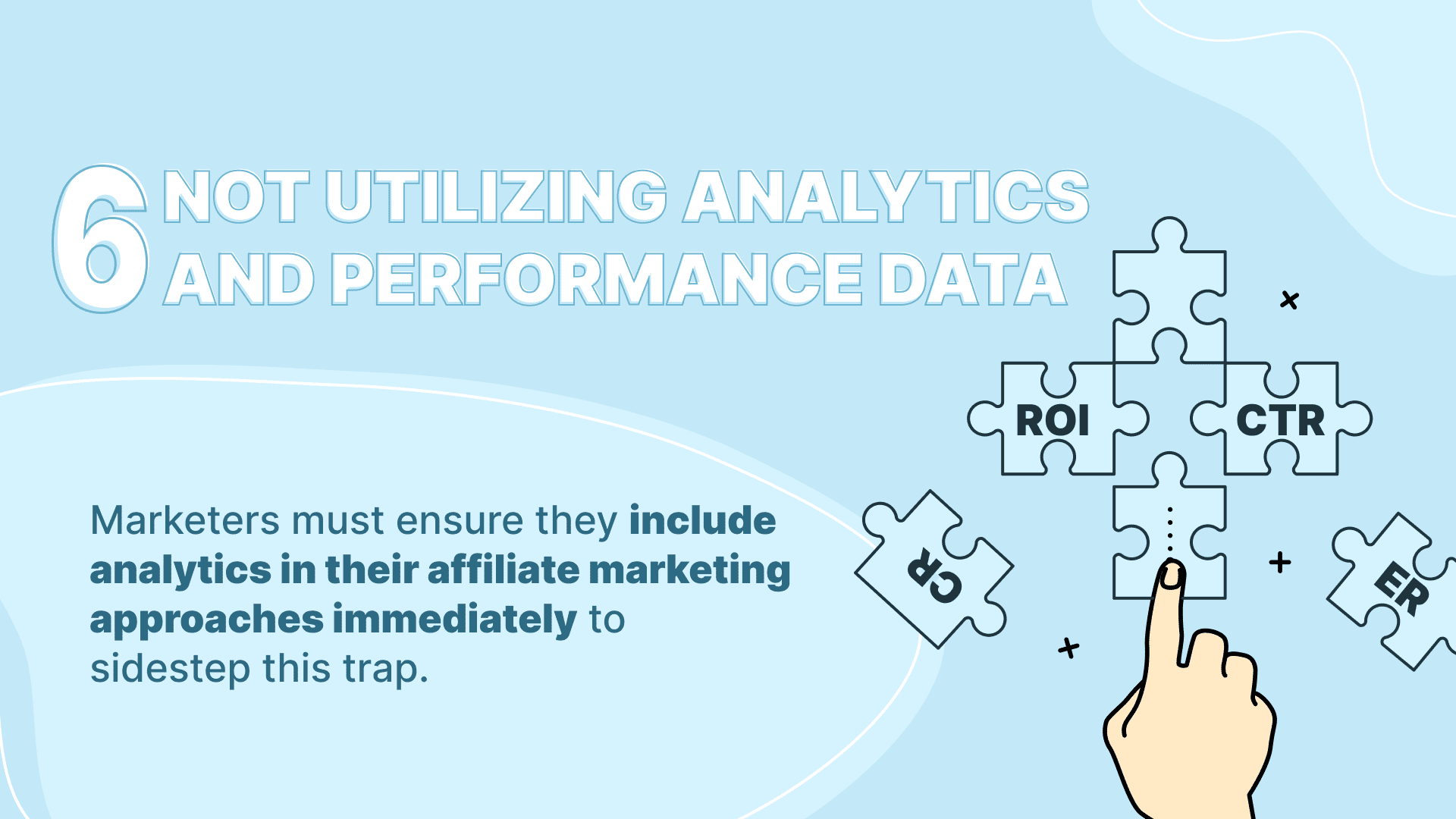
분석 및 퍼포먼스 데이터를 최대한 효과적으로 활용하지 못하면 손해를 볼 수 있습니다. 이러한 중대한 실수는 전략적 결정을 내리고 제휴 캠페인을 최적화할 수 있는 인사이트를 놓치는 것을 의미합니다. 많은 마케터들이 제휴 성과를 꼼꼼하게 추적하고 분석하는 것의 중요성을 인식하지 못하는데, 이는 무엇이 효과가 있고 무엇이 효과가 없는지 파악하는 데 필수적입니다. 전환율, 클릭률, 전체 ROI와 같은 주요 지표에 주의를 기울이지 않으면 제휴 마케팅 담당자는 목표나 오디언스의 관심사에 맞지 않는 캠페인을 맹목적으로 실행하여 리소스를 낭비하고 기회를 놓치게 될 위험이 있습니다.
작업 솔루션
마케팅 담당자는 다음을 확인해야 합니다. 제휴 마케팅 접근 방식에 즉시 분석을 포함시킵니다. 의 함정을 피할 수 있습니다. 강력한 분석 도구와 플랫폼을 활용하면 풍부한 데이터를 얻을 수 있으며, 이를 적절히 분석하면 실행 가능한 인사이트와 패턴을 발견할 수 있습니다. 마케터는 참여율, 제휴사의 매출 기여도, 고객 확보 비용 등 비즈니스 목표에 부합하는 지표에 집중해야 합니다. 또한 성과 데이터를 평가하기 위해 정기적인 검토 주기를 설정하면 캠페인을 적시에 조정하여 효과적이고 효율적인 캠페인을 유지할 수 있습니다. 제휴 마케팅 담당자는 데이터 기반 접근 방식을 채택함으로써 캠페인 성과를 개선하고 지출을 최적화하며 궁극적으로 더 나은 결과를 이끌어내는 정보에 기반한 의사 결정을 내릴 수 있습니다.
7. 단일 트래픽 소스에 대한 과도한 의존
제휴 마케팅에서 한 가지 트래픽 소스에만 지나치게 의존하는 것은 일반적인 오류입니다. 이러한 전략은 알고리즘 업데이트, 정책 변경, 심지어 트래픽 채널 자체의 종료와 같이 마케터가 통제할 수 없는 변화에 취약해지기 때문에 상당한 위험을 초래할 수 있습니다. 한 가지 트래픽 소스에 크게 의존하면 도달 범위와 수익이 갑자기 크게 감소하여 제휴 비즈니스의 지속 가능성을 위태롭게 할 수 있습니다.
작업 솔루션
이러한 위험을 완화하려면 다음을 수행하는 것이 중요합니다. 트래픽 소스를 다양화합니다. 마케팅 담당자는 SEO, 이메일 마케팅, 소셜 미디어, 유료 광고 등 여러 채널에 걸쳐 마케팅 활동을 분산함으로써 보다 안정적이고 탄력적인 트래픽 흐름을 보장할 수 있습니다. 멀티채널 접근 방식은 개별 플랫폼의 변동성으로부터 보호할 뿐만 아니라 더 광범위하고 다양한 오디언스에게 도달할 수 있는 기회를 열어줍니다. 다각화된 트래픽 전략을 구현하려면 지속적인 모니터링과 조정이 필요하지만, 이는 견고하고 지속적인 제휴 마케팅 비즈니스를 구축하기 위한 필수적인 단계입니다.
8. 법적 요건 및 지침 무시
제휴 마케팅을 처음 시작하는 많은 사람들이 저지르는 중대한 실수는 제휴 마케팅 규정을 이해하고 연방거래위원회(FTC) 가이드라인 및 공개 요건을 준수하는 등 법적 요건과 가이드라인의 중요성을 간과하는 것입니다. 이러한 간과로 인해 브랜드 평판이 손상될 뿐만 아니라 막대한 벌금과 법적 문제가 발생할 수 있습니다. 이러한 실수의 핵심은 투명성과 정직성이 윤리적 관행일 뿐만 아니라 오해의 소지가 있는 광고로부터 소비자를 보호하기 위해 법으로 의무화되어 있다는 사실을 인식하지 못하는 데 있습니다.
작업 솔루션
이 복잡한 환경을 성공적으로 탐색하려면 제휴 마케팅 담당자는 먼저 다음을 수행해야 합니다. 운영하는 관할 지역의 관련 법률 및 규정을 교육합니다. 여기에는 제휴사와 제휴사가 보증하는 제품 또는 서비스 간의 관계를 명확하고 눈에 띄게 공개하도록 규정하고 있는 FTC의 제휴 마케팅 가이드라인을 숙지하는 것이 포함됩니다. 포괄적인 규정 준수 전략을 구현하는 것이 중요합니다. 이러한 전략에는 콘텐츠 제작자를 대상으로 투명하고 사용자 친화적인 방식으로 제휴 관계를 적절하게 공개하는 방법에 대한 정기적인 교육이 포함되어야 합니다. 또한 자동화된 도구를 사용하여 공시를 모니터링하고 관리하면 모든 마케팅 자료에서 일관성을 유지하고 법적 기준을 준수할 수 있습니다. 제휴 마케팅 담당자는 법률 준수와 윤리적 마케팅 관행을 우선시함으로써 오디언스와의 신뢰를 구축하는 동시에 법적 영향으로부터 비즈니스를 보호할 수 있습니다.
9. 인내심과 일관성 부족
제휴사들 사이에서 널리 퍼진 오류는 인내심과 꾸준함이 없다는 것입니다. 많은 신규자들이 즉각적인 성공의 매력에 빠져 빠른 재정적 수익을 기대하며 이 분야에 뛰어듭니다. 충성도 높은 잠재고객을 확보하고 그들과 신뢰를 구축하는 것은 시간이 걸리는 과정이기 때문에 이러한 단기적인 사고는 장기적인 제휴 성공의 가능성을 크게 저해합니다. 즉각적인 결과에 대한 조바심은 종종 산발적인 노력과 꾸준하고 전략적인 콘텐츠 제작의 부족으로 이어지며, 이는 참여도를 높이고 유지하는 데 매우 중요합니다.
작업 솔루션
이러한 일반적인 실수를 피하기 위해 제휴사는 다음을 수행해야 합니다. 인내와 규칙적인 헌신을 바탕으로 한 태도를 수용합니다. 여기에는 현실적인 기대치를 설정하고 제휴 마케팅의 성공은 오디언스와의 정기적이고 양질의 참여가 누적된 결과라는 점을 이해하는 것이 포함됩니다. 콘텐츠 일정을 수립하고, 시장 조사에 시간을 할애하고, 정기적으로 실적 데이터를 분석하여 전략을 개선하면 꾸준한 성과를 유지하는 데 도움이 될 수 있습니다. 인내심과 꾸준한 노력은 단순한 전략이 아니라 제휴 마케팅의 지속 가능한 성장을 위한 초석입니다. 이러한 가치를 수용함으로써 제휴사는 단기 목표뿐만 아니라 장기적인 포부를 뒷받침하는 견고한 기반을 구축하여 경쟁이 치열한 제휴 마케팅 환경에서 보다 안정적이고 수익성 있는 여정을 보장할 수 있습니다.
10. 학습과 성장에 투자하지 않음
많은 제휴 마케팅 담당자가 흔히 저지르는 실수 중 하나는 자신의 학습과 성장에 투자하지 않는 것입니다. 제휴 마케팅의 역동적인 특성 때문에 새로운 트렌드, 알고리즘 업데이트, 혁신적인 마케팅 전략에 앞서 나가기 위해 끊임없이 경계해야 합니다. 이러한 측면을 소홀히 하면 성장이 정체되고 경쟁력이 떨어지며 궁극적으로 수익이 감소할 수 있습니다. 많은 마케터들이 현재 전략의 일상에 얽매여 끊임없이 변화하는 디지털 마케팅 환경에 적응하기 위해 지식과 기술을 발전시키는 것의 중요성을 간과하고 있습니다.
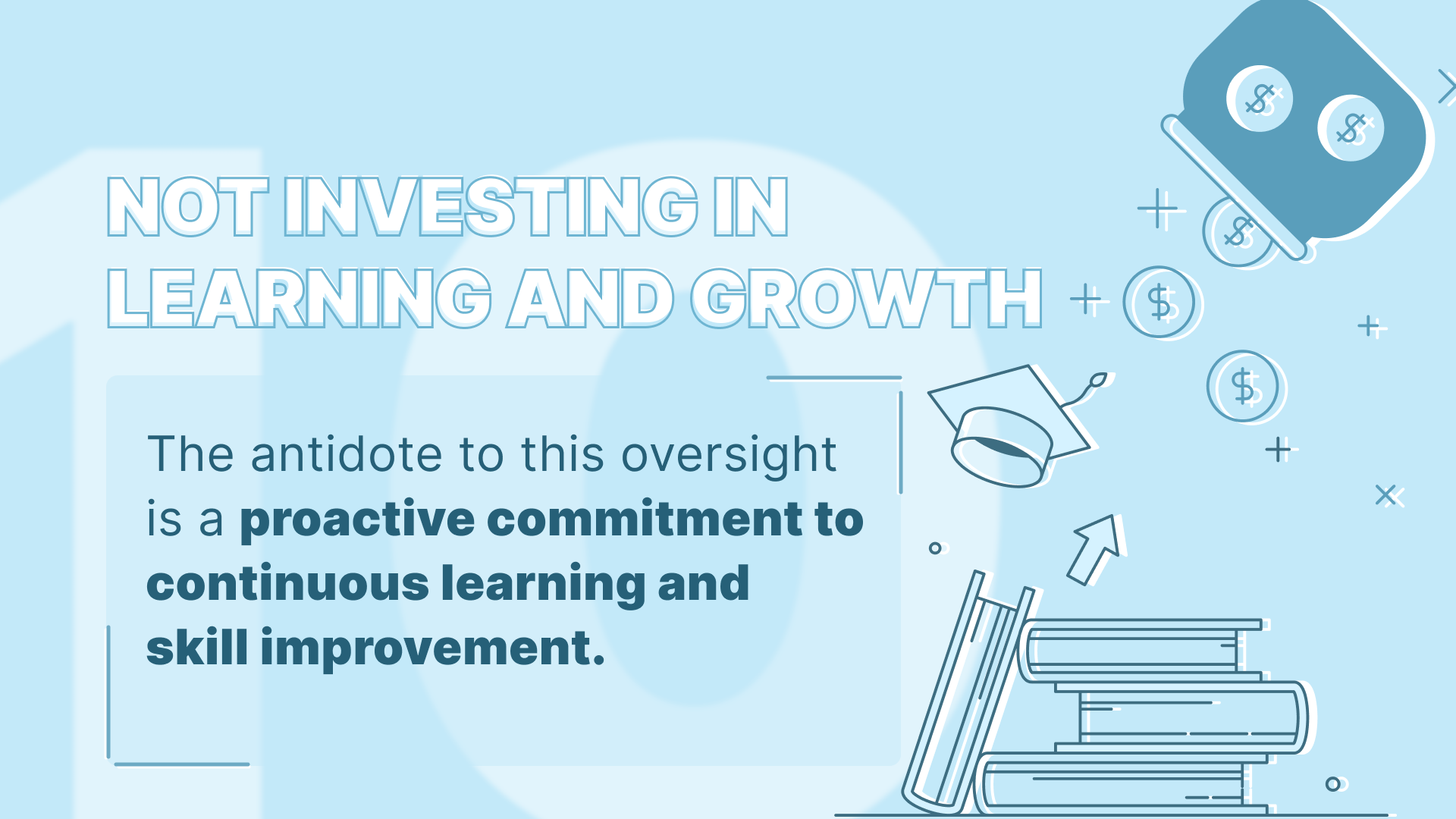
작업 솔루션
이러한 감독에 대한 해독제는 지속적인 학습과 기술 향상을 위해 적극적으로 노력합니다. 이를 위해서는 제휴 마케팅의 최신 트렌드와 모범 사례에 대한 정보를 얻기 위해 시간과 리소스를 투자해야 합니다. 마케터는 온라인 강좌, 웨비나, 업계 블로그, 컨퍼런스 등 다양한 리소스를 활용하여 이해를 넓히고 접근 방식을 개선해야 합니다. 또한 제휴 마케팅 담당자 커뮤니티에 참여하면 귀중한 인사이트를 얻고 지식 공유 문화를 조성할 수 있습니다. 제휴 마케팅 담당자는 전략의 초석으로 학습을 우선시함으로써 효과를 높이고 더 나은 결과를 이끌어내며 경쟁이 치열한 제휴 마케팅 환경에서 장기적인 성공을 지속할 수 있습니다.
최종 생각
솔직히 말해서 완벽하고 모든 실수를 피하는 것은 불가능합니다. 하지만 가장 치명적인 실수를 피하기 위해 최선을 다하고 있습니다. 동료들의 경험과 저희의 선택을 바탕으로 잠재적 위험에 주의를 기울이는 기술을 연마했다면 큰 수익과 높은 ROI로 가는 길에 문제를 극복할 가능성이 더 높습니다. 결국, 등반을 해보지 않은 사람만이 넘어져 본 적이 없습니다. 가장 중요한 것은 넘어지는 것을 피하는 것이 아니라 다시 일어설 수 있는 힘과 지혜(그리고 적절한 위험 관리)를 찾는 것입니다.


















